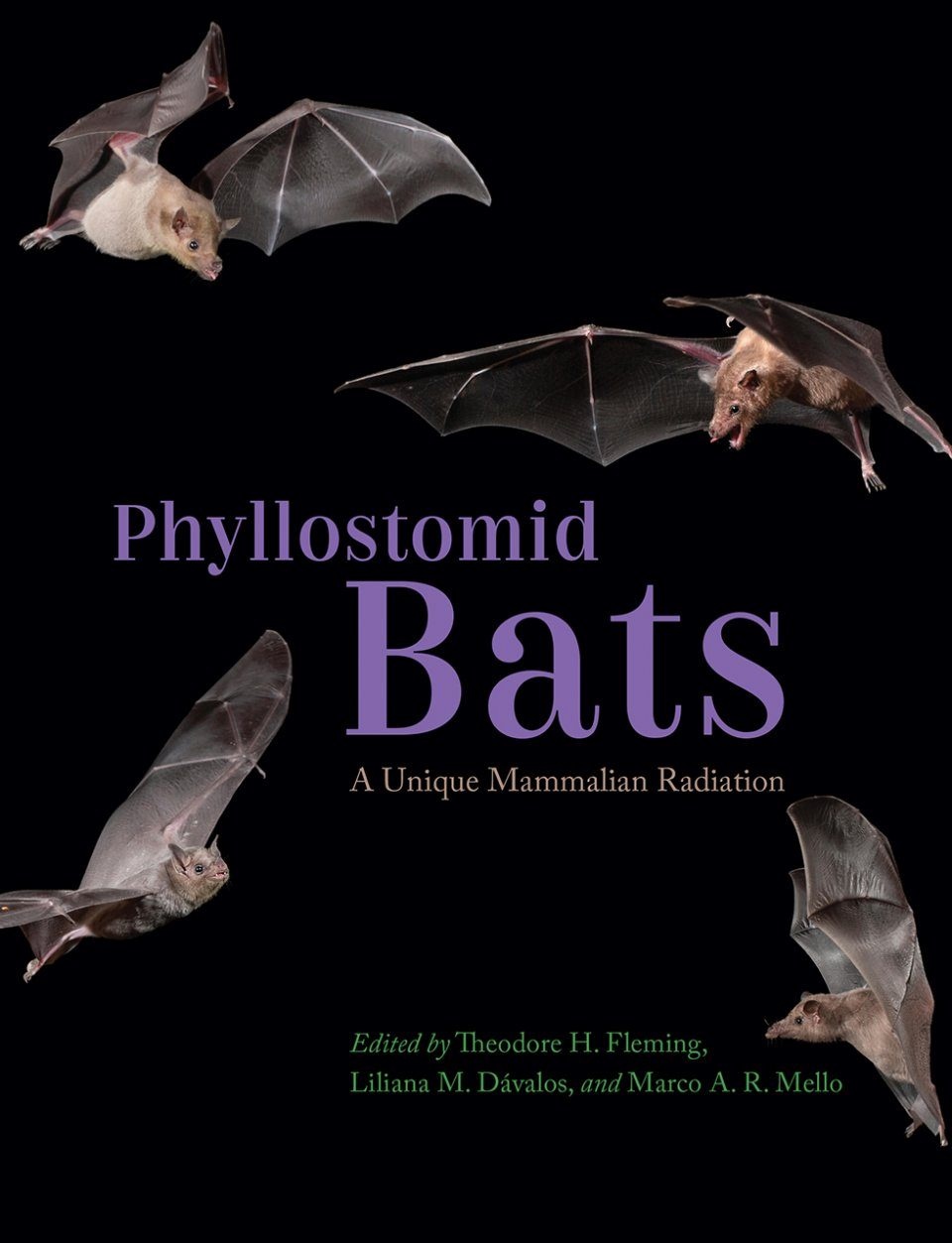
Phyllostomid Bats - A Unique Mammalian Radiation
- Inklusive 9% MwSt.: €82,40
- Ohne MwSt: €75,60
- Versandkosten nur 7,82 € nach Deutschland
- An Werktagen vor 17 Uhr bestellt? Versand am selben Tag!
- 14 Tage Rückgaberecht
- Bei uns ist nichts unmöglich!


| Autoren | Theodore H. Fleming, Liliana M. Dávalos & Marco A.R. Mello |
| Sprache | Englisch |
| ISBN | 9780226696126 |
| Verlag | University of Chicago Press |
| Seiten | 470 |
| Format | Gebunden |
| Bilder | S/w-Illustrationen und Farbfotos |
| Erscheinungsjahr | 2020 |
With more than two hundred species distributed across most of mainland Mexico, Central and South America, and islands in the Caribbean Sea, the Phyllostomidae bat family (American leaf-nosed bats) is one of the world's most diverse mammalian families in terms of its trophic, or feeding, diversity. From an insectivorous ancestry, extant species have evolved into several dietary classes, including blood-feeding, vertebrate carnivory, and the consumption of nectar, pollen, and fruit, in a period of about 30 million years. Phyllostomidae's plant-visiting species are responsible for pollinating more than five hundred species of neotropical shrubs, trees, vines, and epiphytes – many of which are economically and ecologically important – and they also disperse the seeds of at least another five-hundred plant species. Fruit-eating and seed-dispersing members of this family thus play a crucial role in the regeneration of neotropical forests, and the fruit eaters are among the most abundant mammals in these habitats.
Coauthored by leading experts in the field and synthesizing the latest advances in molecular biology and ecological methods, Phyllostomid Bats is the first overview in more than forty years of the evolution of the many morphological, behavioural, physiological, and ecological adaptations in this family. Featuring abundant illustrations as well as details on the current conservation status of phyllostomid species, it is both a comprehensive reference for these ecologically vital creatures and a fascinating exploration of the evolutionary process of adaptive radiation.
Contents
Section 1 Introduction
1 Overview of This Book / Theodore H. Fleming, Liliana M. Dávalos, and Marco A. R. Mello
2 Setting the Stage: Climate, Geology, and Biota / Theodore H. Fleming
Section 2 Phylogeny and Evolution
3 Phylogeny, Fossils, and Biogeography: The Evolutionary History of Superfamily Noctilionoidea (Chiroptera: Yangochiroptera) / Norberto P. Giannini and Paúl M. Velazco
4 Diversity and Discovery: A Golden Age / Andrea L. Cirranello and Nancy B. Simmons
5 Fragments and Gaps: The Fossil Record / Nancy B. Simmons, Gregg F. Gunnell, and Nicolas J. Czaplewski
6 Phylogenetics and Historical Biogeography / Liliana M. Dávalos, Paúl M. Velazco, and Danny Rojas
7 Adapt or Live: Adaptation, Convergent Evolution, and Plesiomorphy / Liliana M. Dávalos, Andrea L. Cirranello, Elizabeth R. Dumont, Stephen J. Rossiter, and Danny Rojas
8 The Evolution of Body Size in Noctilionoid Bats / Norberto P. Giannini, Lucila I. Amador, and R. Leticia Moyers Arévalo
Section 3 Contemporary Biology
9 Structure and Function of Bat Wings: A View from the Phyllostomidae / Sharon M. Swartz and Justine J. Allen
10 The Relationship between Physiology and Diet / Ariovaldo P. Cruz-Neto and L. Gerardo Herrera M.
11 Sensory and Cognitive Ecology / Jeneni Thiagavel, Signe Brinkløv, Inga Geipel, and John M. Ratcliffe
12 Reproduction and Life Histories / Robert M. R. Barclay and Theodore H. Fleming
13 Patterns of Sexual Dimorphism and Mating Systems / Danielle M. Adams, Christopher Nicolay, and Gerald S. Wilkinson
Section 4 Trophic Ecology
14 The Omnivore’s Dilemma: The Paradox of the Generalist Predators / Claire T. Hemingway, M. May Dixon, and Rachel A. Page
15 Vampire Bats / John W. Hermanson and Gerald G. Carter
16 The Ecology and Evolution of Nectar Feeders / Nathan Muchhala and Marco Tschapka
17 The Frugivores: Evolution, Functional Traits, and Their Role in Seed Dispersal / Romeo A. Saldaña-Vázquez and Theodore H. Fleming
Section 5 Population and Community Ecology
18 Roosting Ecology: The Importance of Detailed Description / Armando Rodríguez-Durán
19 Population Biology / Theodore H. Fleming and Angela M. G. Martino
20 Community Ecology / Richard D. Stevens and Sergio Estrada-Villegas
21 Network Science as a Framework for Bat Studies / Marco A. R. Mello and Renata L. Muylaert
22 Contemporary Biogeography / Richard Stevens, Marcelo M. Weber, and Fabricio Villalobos
Section 6 Conservation
23 Challenges and Opportunities for the Conservation of Brazilian Phyllostomids / Enrico Bernard, Mariana Delgado-Jaramillo, Ricardo B. Machado, and Ludmilla M. S. Aguiar
24 Threats, Status, and Conservation Perspectives for Leaf-Nosed Bats / Jafet M. Nassar, Luis F. Aguirre, Bernal Rodríguez-Herrera, and Rodrigo A. Medellín
Contributors
Index
Es wurden noch keine Bewertungen für dieses Produkt abgegeben..
Vervollständigen Sie Ihre Bestellung